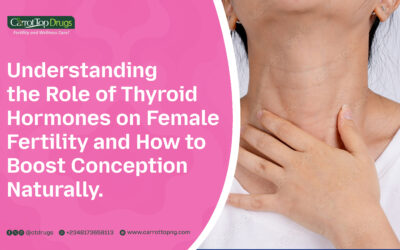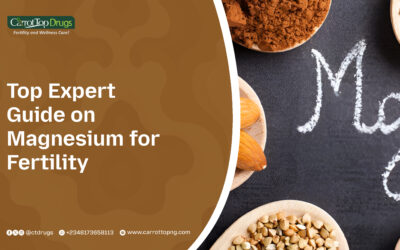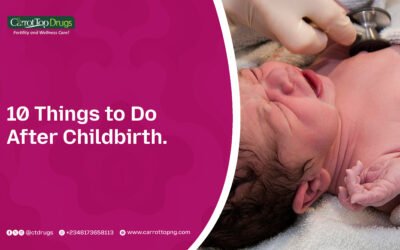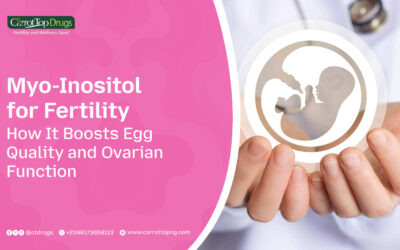Introduction
For a large number of newlywed or much older couples, fertility is an essential factor in their life. It is a sensitive topic, and there are many myths surrounding it. Couples need to know how fertility works as this can help them make informed decisions about planning their family. But, often, some facts could be pretty confusing. There are some fertility facts that many aren’t aware of.
In this article, you will get to know seven surprising fertility facts you probably didn’t know before now:
1. Infertility Affects Men Just as Much as Women
One of the fertility facts that may not be commonly known is that men can also experience infertility due to a variety of reasons. Medical conditions such as hormonal imbalances, genetic disorders, sexually transmitted infections, and reproductive organ issues can all contribute to male infertility. Additionally, lifestyle habits such as excessive alcohol or drug use, smoking, poor diet, stress, and environmental factors can also impact sperm quality and fertility in men.
Infertility in men can have a significant emotional and psychological impact, just as it does for women. Men may experience feelings of guilt, shame, frustration, and a sense of failure when they are unable to father a child. This can lead to increased stress, anxiety, and strain on relationships, as well as a decrease in overall quality of life.
Furthermore, men also face challenges when it comes to seeking infertility treatments. This is a fertility fact that couples ought to know. There is often a stigma attached to male infertility, and men may feel reluctant to openly discuss their struggles or seek medical help. This can result in delayed diagnosis and treatment, which can further exacerbate the issue.
Our Advice
It is important to recognize that when a couple is trying to conceive, men and women are equal partners in the process. Both partners should undergo thorough medical evaluations and receive appropriate support and care. Treatment options for male infertility may include lifestyle changes, medication, surgery, or assisted reproductive techniques such as in-vitro fertilization (IVF) or intracytoplasmic sperm injection (ICSI).
In conclusion, infertility is not solely a women’s issue but affects men just as much. It is crucial to raise awareness about male infertility and provide support and resources for men facing this challenge. Recognizing and addressing the emotional and psychological impact of infertility on men is also vital. By acknowledging and addressing male infertility, we can work towards a more inclusive and supportive approach to fertility care for couples struggling to conceive. We would discuss other fertility facts as we progress. Ready? Let’s go!
2. Sperm Counts Can Change Over Time
One of the fascinating fertility facts that many people may not be aware of is that sperm counts can vary significantly over time. Sperm count refers to the number of sperm cells present in a given volume of semen, and it is an important factor in male fertility. This is a fertility fact that you may not be aware of.
Several factors can influence sperm count, including age, diet, and lifestyle habits. Age is one such factor that can affect sperm count, with studies showing that sperm count tends to decline as men age. As men get older, the quantity and quality of sperm may decrease, making it more challenging to conceive.
Diet and lifestyle habits also play a crucial role in sperm count. Unhealthy dietary choices, such as a diet high in processed foods, saturated fats, and sugar, may negatively impact sperm count. Similarly, lifestyle habits such as smoking, excessive alcohol intake, and a sedentary lifestyle can also have detrimental effects on sperm count. Studies have shown that smoking, for example, can reduce sperm count and motility, and increase the number of abnormal sperm.
Our Advice
It is important to be aware of these factors and take steps to improve sperm count if you are trying to conceive. Adopting a healthy lifestyle that includes a balanced diet rich in fruits, vegetables, whole grains, lean proteins, and healthy fats can help optimize sperm health. Regular exercise, avoiding smoking and excessive alcohol intake, and managing stress can also positively impact sperm count.
If you are concerned about your sperm count, it is essential to consult with a healthcare provider who can perform a thorough evaluation and provide personalized recommendations. In some cases, medical interventions such as medication or surgery may be necessary to improve sperm count.
We advise that you take supplements like Evergreen Formular For Men and Evergreen Motility. This help to promote the quality of your sperm cells. Evergreen Motility is a supplement that helps to deal with poor sperm motility.
3. Smoking Reduces Conception
Another important fertility fact that many people may not be aware of is that smoking can significantly reduce the chances of conception for both men and women. Smoking is a leading cause of infertility and has detrimental effects on fertility in both sexes, although the impacts may be more pronounced in women.
In women, smoking can delay conception by reducing the quality and quantity of eggs available for fertilization. It can also increase the risk of spontaneous abortions, miscarriages, premature births, and other complications that may affect fertility. Smoking during pregnancy has been linked to low birth weight and developmental issues in babies as well.
In men, smoking also has a negative impact on fertility. Studies have shown that smoking can decrease sperm count by up to 60% and reduce sperm quality by up to 40%. This can significantly impair the ability of sperm to fertilize an egg and decrease the chances of conception.
The harmful effects of smoking on fertility are primarily attributed to the toxic chemicals present in cigarettes, such as nicotine, tar, and carbon monoxide, which can damage the reproductive organs and disrupt the delicate hormonal balance necessary for fertility. These toxic substances can also cause DNA damage to sperm and eggs, further reducing their quality and ability to successfully conceive.
Our Advice
It’s important for couples who are trying to conceive to understand the negative impact of smoking on fertility and take steps to quit smoking. Quitting smoking can significantly improve the chances of conceiving and having a healthy pregnancy. Seeking support from healthcare professionals, using nicotine replacement therapy, counselling, and making lifestyle changes can all be helpful in quitting smoking.
4. Conception Rates for Women Above 40 years are Relatively Low
Another important of the fertility facts is that the conception rates for women above the age of 40 are relatively low. Over the last few decades, there has been a decline in fertility rates for women in this age group, and this trend is observed globally. There are various reasons contributing to this decline, including biological, lifestyle, and social factors.
Biologically, women’s fertility declines as they age. Women are born with a finite number of eggs, and as they get older, the quantity and quality of eggs decrease, which can make it more challenging to conceive. Additionally, the risk of genetic abnormalities, such as Down syndrome, increases with maternal age.
Lifestyle and social factors also play a significant role in the decline of conception rates for women above 40. Many women choose to delay pregnancy due to factors such as pursuing careers, furthering their education, or finding a suitable partner with whom to start a family. This trend of delaying pregnancy until later in life can impact fertility rates for women in their late 30s and early 40s.
Moreover, other lifestyle factors such as stress, poor diet, lack of physical activity, and certain medical conditions can also affect fertility in women as they age. These factors can disrupt the hormonal balance and overall reproductive health, making it more difficult to conceive.
Our Advice
It’s important for women who are planning to conceive after the age of 40 to be aware of the potential challenges and take appropriate steps to optimize their fertility. Consulting with a healthcare professional, adopting a healthy lifestyle, and considering fertility treatments or assisted reproductive technologies, such as in vitro fertilization (IVF), may be options to improve the chances of conception.
For women above 30, we advise that you take our Evergreen Formular For Women and Evergreen Eggboost for Women. They help to boost oocyte quality and promote ovulation. Also since women above 30 years have issues with dryness, we advise such women to take our Evergreen CM and use a fertility-friendly lubricant like PRE~SEED Personal Vaginal Lubricant.
5. Being Underweight or Overweight Can Decrease Conception Chances
Another fertility fact you may not be aware of is that not only being overweight is a concern. Being underweight should also be a source of concern as well. Maintaining healthy body weight is a crucial factor when it comes to fertility, and being either underweight or overweight can decrease the chances of conception. A study involving the analysis of data from 140,000 women who were trying to conceive revealed significant findings on the effect of weight on fertility.
The study showed that women who were obese had the lowest chance of conceiving, and those who were morbidly obese had an even lower chance of conceiving. The researchers also found that women with a BMI (Body Mass Index) of 35 or more had an increased risk of infertility. By examining the data from this study, the researchers were able to establish associations and correlations between weight and reproductive outcomes.
Furthermore, the study also revealed that women who were underweight also had a lower chance of conceiving. Maintaining a healthy body weight is essential for optimal reproductive health. Both being underweight and overweight can disrupt the hormonal balance in the body, affecting ovulation and the overall reproductive function, thereby decreasing the chances of conception. This is one of the fertility facts that we think you ought to know.
Our Advice
It is important for individuals who are planning to conceive to be aware of the impact of weight on fertility and take steps to achieve and maintain a healthy body weight. This can be achieved through a balanced diet, regular physical activity, and maintaining a healthy lifestyle. Consulting with a healthcare professional or a registered dietitian can also provide personalized guidance on achieving and maintaining a healthy body weight to optimize fertility.
6. Diet and The Conflict Around It
Diet and its effect on fertility can be a contentious issue, with conflicting facts and studies presenting contradictory claims. Some studies suggest that a healthy diet can increase fertility, while others show the opposite. However, there are certain points of consensus.
It is generally agreed upon that a healthy diet can positively impact fertility. Certain foods, such as fruits, vegetables, and whole grains, can help maintain hormonal balance in the body, which is crucial for reproductive health. These foods are rich in antioxidants, vitamins, and minerals that support overall health and can contribute to improved fertility.
On the other hand, a poor diet high in unhealthy fats and sugars can adversely affect fertility. Research has shown that diets high in trans fats, saturated fats, and added sugars can decrease the quality and quantity of sperm produced, which can reduce the chances of successful conception.
It is important to note that diet alone may not be the sole determining factor in fertility, and other lifestyle factors such as exercise, sleep, stress management, and overall health also play a significant role. Maintaining a healthy lifestyle that includes a balanced diet, regular exercise, and adequate sleep can collectively contribute to optimizing fertility.
Our Advice
The good news is that there are many ways to improve fertility without resorting to expensive and invasive procedures like in-vitro fertilization (IVF). Taking a proactive approach to taking care of your body by making healthy lifestyle choices, including a nutritious diet, regular exercise, and sufficient sleep, can positively impact fertility and increase the chances of conception.
7. Basal Temperature Charting May Not Always Be An Accurate Means To Predict Ovulation
The last of the fertility facts that we want to discuss is the prediction of ovulation. Basal temperature charting is a widely used fertility awareness method. However, it may not always be entirely accurate in predicting ovulation. This method is based on the premise that a woman’s basal body temperature increases slightly after ovulation, and by tracking these temperature changes. It is possible to identify the fertile window for conception.
One of the limitations of basal temperature charting is that it relies on a single factor, namely basal body temperature, to predict ovulation. However, there are several external factors that can influence basal body temperatures. Such as stress, illness, poor sleep quality, alcohol consumption, and changes in daily routine. These may affect the accuracy of the method. For instance, stress can disrupt hormonal balance, leading to fluctuations in basal body temperature and potentially inaccurate predictions of ovulation.
Additionally, basal temperature charting requires consistent and accurate daily measurements of basal body temperature. This may not always be feasible for all women. It requires taking the temperature at the same time every morning, before getting out of bed, and recording the readings diligently. Any lapses or irregularities in temperature measurement or recording may compromise the reliability of the method.
It is also worth noting that basal temperature charting can only confirm ovulation after it has occurred. This is as the temperature rise is observed retrospectively. By the time the woman detects the basal body temperature, the fertile window may have already passed. Thus making it less effective for timing intercourse for conception.
Our Advice
It is important to use basal temperature charting in conjunction with other fertility awareness methods. Consult with a healthcare professional for accurate and personalized fertility tracking.
PREDICTE OVULATION TEST KIT is highly recommended to help women know when they are ovulating. The test kit has a 98% accuracy rate. It helps you know your most fertile days. This would help you plan intercourse with your partner to when you have a higher chance of conception each cycle.
Conclusion
In this article, we have been able to show you some fertility facts that you may not be familiar with. We have also been able to show you how to adjust to this new information. Finally, for women, PREDICTE OVULATION TEST KIT is a very easy way to predict your ovulation period. You should also take our recommended supplements to boost your fertility.

















